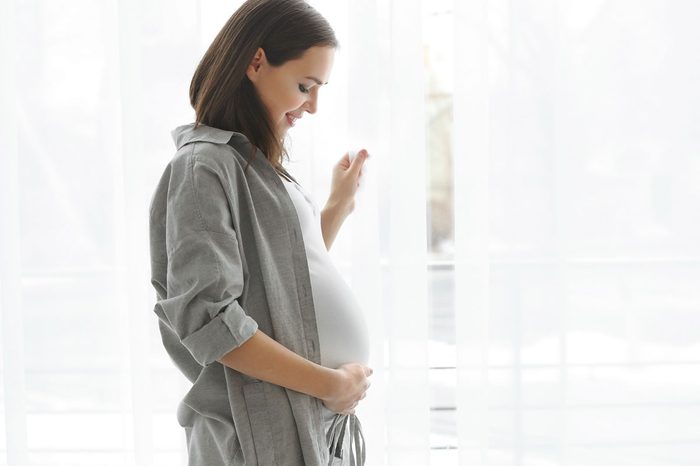
Pregnancy in the age of coronavirus
Covid-19, is causing major concern around the globe, including in Canada, where there are over 17,000 cases, according to Johns Hopkins University. The thought of labour and delivery can be stressful enough during pregnancy (particularly if it’s your first child). But in this age of coronavirus, however, expectant mothers have an added layer of uncertainty and concern, including how the virus might affect the health of the fetus to potentially having to give birth alone.
Unfortunately, not much is yet conclusively known about how coronavirus affects pregnancy. (The flu, on the other hand, is known to be particularly risky for the health of pregnant women and fetuses, which is why flu shots are recommended before or during pregnancy.)
For coronavirus, “the effects are still unknown in the first trimester, regarding birth defects, but there hasn’t been a large increase seen in miscarriages, though data is sparse,” says Felice Gersh, MD, ob/gyn, founder/director of the Integrative Medical Group of Irvine, in California and author of PCOS SOS Fertility Fast Track. “Later in the pregnancy, there may be heightened risks for preterm delivery, growth restriction, placental abruptions, and more C-sections.” Luckily, there does not seem to be a substantial increase in the risk of stillbirth.
“No infants born to mothers with Covid-19 have tested positive for the Covid-19 virus,” according to the Centers for Disease Control and Prevention (CDC). “In these cases, which are a small number, the virus was not found in samples of amniotic fluid or breastmilk.”
Still, mothers-to-be are heading into hospitals just as they’re forecasted to be critically short-staffed and underequipped. “Hospitals around the country are implementing changes in response to the Covid-19 pandemic,” says Diana Spalding, certified nurse-midwife, pediatric nurse, and author of forthcoming The Motherly Guide to Becoming Mama. “The most profound is likely the change to support teams, but other possible changes might be more extensive questioning upon admission to assess individual risk, and people wearing masks and [personal protective equipment] PPE.”
Many hospitals are now only allowing one support person in the room, with no postpartum visitors, and some women are delivering wearing masks or having unplanned C-sections, with their birth plans out the window. “Paying attention to the mental health of new mothers is essential—new moms are vulnerable as it is, but this pandemic makes them even more so,” says Spalding. “This feels like such an isolating experience to go through, but new mothers need to know they are so deeply held, and not alone.”
We spoke with 10 expectant mothers about their anxieties surrounding their impending births. Here, women share in their own words their fears and hopes about giving birth in the age of coronavirus.
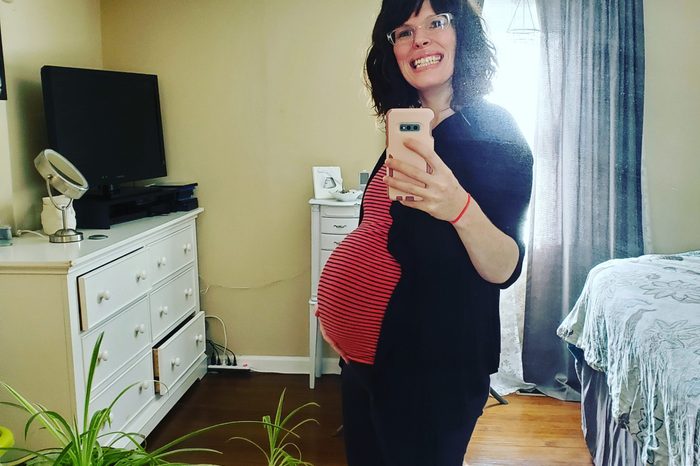
So much is changing every day
“This is a nightmare and I can’t imagine a worse time to be pregnant,” confesses Lauren Wellbank, a mother of two who is 39 weeks pregnant. “Everything is so unprecedented, and things are changing every day, I feel like I can’t catch my breath. I feel like I’m in a suspended state of horror because every time I turn around something else crazy is happening.” Wellbank shares that she just got word that her hospital will take temperatures every six hours for the duration of her stay at the hospital. “If they become elevated at any time, they may separate us from the baby.”
“I’m actually less worried about catching the virus than I am about something happening because the hospital is short-staffed or because their new policies and procedures are reactionary instead of being well thought out,” she says. “I heard a story last night about a new mom in north Jersey having her baby taken away from her because she experienced an unexpected uterine rupture and they were afraid that was a sign that she had Covid-19. I simply cannot imagine someone taking my newborn from me during such a crucial time.”
While Wellbank previously had a birth plan, she’s given it up. “My birth plan has sprouted wings and flown out the nearest window. Absolutely nothing looks the way it did two months ago when I filled it out. The only thing that is still the same is that I’d like to avoid an epidural. At this point that has more to do with not wanting extra people in the delivery room with me and less to do with my original concerns that stem from a prior bad experience.”
Still, she’s finding silver linings. “I’m still very hopeful that things won’t be as bad as I’m afraid they will be. Childbirth, no matter how many times you’ve done it, is unpredictable. Even without a pandemic, there would be things for me to stress about. I’m way less worried about how much pain I’ll be in and more worried about everything else that is happening.”
Wellbank is also grateful for her OB/GYN. “I would be remiss if I didn’t mention how great my OB and her staff have been. I was having a panic attack in the exam room today while I was waiting for her to come in and talk to me about an induction (they are currently asking all their patients to schedule an induction as soon as is reasonable to avoid having people deliver during our estimated “peak”). I was literally in tears by the time she walked in and by the time we finished the exam I felt a million times better. I now feel more confident in my choice to continue with a hospital birth.”
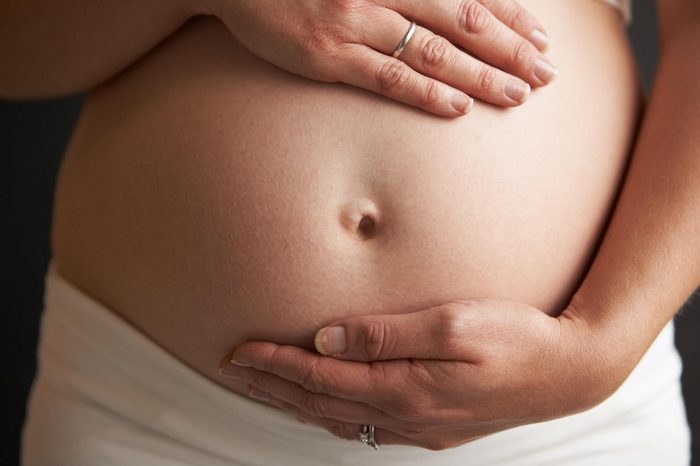
Hoping their partner can be there during delivery
“There’s a lot going through my mind experiencing all of this,” says 30-weeks pregnant Lisa Kullman, mother to a 3-year-old girl. “We struggled for three years to get pregnant with our daughter and ended up doing IVF. I always said if we can get through that, we could get through anything: being pregnant and giving birth was nothing compared to struggling to get pregnant and the IVF process. This pandemic is really testing that statement.”
As her baby’s birth approaches and cases continue to spread, Kullman has realized the pandemic will affect her delivery. “At first, I think I assumed that the pandemic would be ‘over’ by the time I needed to start preparing for our second child. That this was not going to be something that even affected this pregnancy at all. Things we took for granted with our daughter, like being able to run to the store or ordering whatever we needed online and having it be available, are proving to be very different this time. Just today I looked at diapers on Amazon and the delivery date was in May!”
She’s trying to keep her anxieties at bay, but it’s difficult. “I keep saying to myself ‘you still have 10 weeks.’ I went to my OB appointment today and everyone was wearing masks and the reality of the situation hit me like a ton of bricks. I knew in my head the doctor would be wearing a mask but experiencing the appointment like that really affected me. I got into my car and cried. I thought about how that could be how it is when I got to the hospital when I give birth, everyone in masks, maybe even me. Not allowed to leave my room…it’s scary.”
The biggest fear, however, is that her partner might not be allowed into the room. “This is my biggest anxiety about giving birth, not having my husband with me. He was my advocate during the birth of my daughter. I had some complications after giving birth that I needed him there for so that idea of him not being there is terrifying.”
Despite it all, Kullman is trying to keep a sense of humour about it. “My husband keeps reminding me that I’m pretty lucky to be spending my third trimester working from home wearing comfortable clothes. I’m saving money on maternity clothes that’s for sure! I’m also trying to enjoy the massive increase in family time while it’s just the 3 of us: my husband, daughter, and me. I have more time to prepare for our baby’s arrival not commuting to the office daily, so all of that are some silver linings.” (In need of a self-care day? Here are some tips for treating your mind, body, and soul at home.)
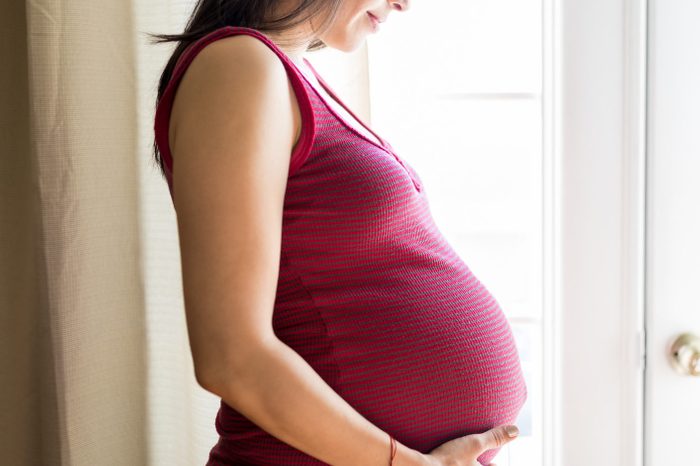
Looking forward to a source of joy in dark times
“I did not choose or plan to be pregnant during a once-in-a-century global pandemic,” says 36-weeks-pregnant Natalie Aldern Kennedy, mother of one child. “I feel that the health crisis has added yet another layer of uncertainty to pregnancy. This makes me more anxious than I otherwise would be: having one more, very big, thing to worry about.”
While Kennedy is not as worried about labour itself, having been through it previously with her son, she is nervous her husband won’t be allowed into the delivery room, and childcare plans are up in the air. “This is my main worry. As of right now, partners are allowed in the delivery room, but not allowed in other parts of the hospital. However, because of the current rules in place at the national level, we don’t have childcare for our two-year-old so there is a good chance my husband will have to stay home with him, even if partners are allowed. I expected that my husband would be with me, and I assumed that I would be able to request an epidural if I wanted. Both of those things are now up in the air because of hospital rules on visitors/partners, as well as the canceling of ‘non-essential’ appointments, which I would need to be pre-approved for the epidural.”
Because her hospital is small and specializes in maternity and non-infectious diseases, Kennedy is not worried about coronavirus patients being there. “I am more concerned that despite our best efforts, my newborn may be exposed at some point. There is so little known about how the virus impacts children this young.”
If anything provides comfort, it’s the future. “The baby is a great source of hope herself. While we are anxious about the future that awaits her, we cannot wait to meet her. We feel continuously worn down by the bad news and the tragedies that other families are grappling with, but we hope that this new life can be a source of joy for others as well as we face these dark times.”
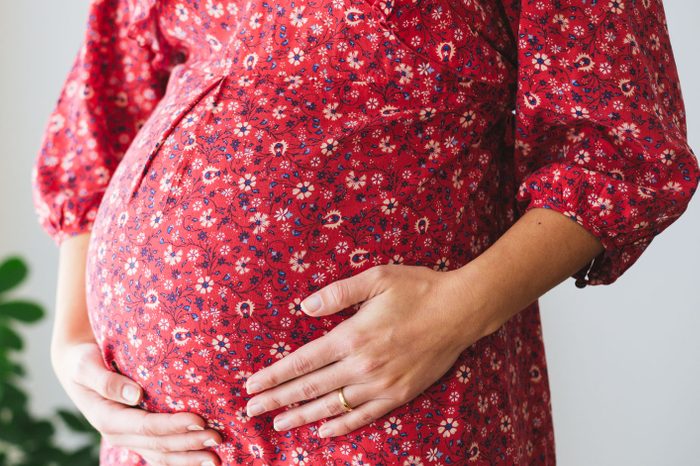
Being extra vigilant about social distancing
“Being pregnant has made the pandemic a lot scarier,” says Whitney Sandoval, 36 weeks pregnant with her second pregnancy and third child. “Although so far, most of the information coming out about women who are pregnant and babies being born is positive, there isn’t clear information on the ramifications of catching Covid-19 while pregnant.”
About one month away from delivery, Sandoval assumed she’d be anxious for her baby to be born about now, but instead she’s trying to keep him in. “I’m kindly asking him to stay put all four weeks,” she says.
Catching the virus is a fear, for a variety of reasons. “I’m worried about what it would mean if I caught it in terms of my family and the birth experience. I have two toddlers and can’t imagine having to isolate from them for two weeks. If I caught the virus, I would have to birth without my partner. I haven’t allowed myself to look at what happens after delivery if the mother is positive for Covid-19 when she delivers. Would I still get to see my baby? Would I have to be quarantined from him too? My biggest anxiety is that I’ll contract Covid-19 within a two-week window of my delivery.” (If you’re worried about infecting your family, here’s how you can stop the spread of coronavirus at home.)
Sandoval is grateful her city of Wichita is still allowing one partner to attend hospital births, although she’s hoping for a home birth. “This week, I sat down and made a series of birth plans to be mentally prepared if I get Covid-19, if someone in my family gets Covid-19, if we get transferred to a hospital, and if my husband can’t be in the delivery room.” Both Sandoval and her husband have been strictly social distancing for more than two weeks and plan to keep it up. “We’re hopeful neither of us nor our children will get Covid-19 and we won’t have to worry about who in our family can and cannot be there. I am hopeful nothing too crazy will change in the next four weeks.”
“My pregnancy anxiety has been pretty high, and the pandemic is only increasing it. But, I have been trying really hard to focus on the positives,” Sandoval says, trying to stay upbeat.
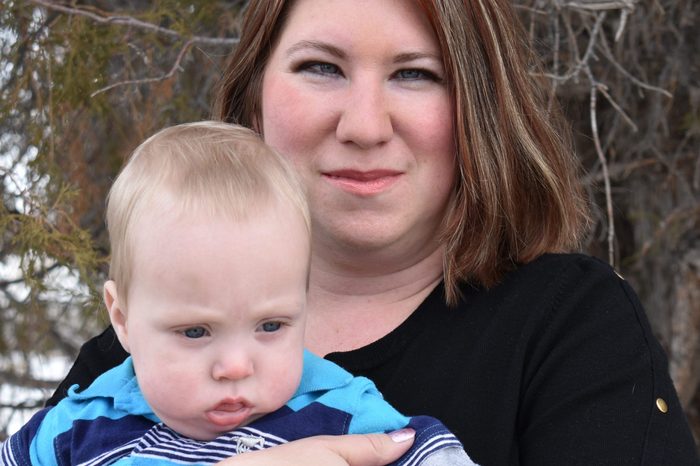
Grateful for time to focus on baby’s arrival
“My first child arrived at 36 weeks and I’m considered high risk for going early again, so I’m being monitored pretty closely,” explains Kate Wehr, 30 weeks pregnant with four children. “With this virus, I did suggest a home birth the other night—there have been several in our families—but my husband isn’t on board with that idea at all. Since we had complications last time, that’s understandable.”
Wehr is apprehensive about the possibility of being alone during labour and delivery or postpartum. “I’m concerned they won’t allow my partner in the room, or my children to visit after. I just saw an article saying the CDC is recommending separating newborns from their mothers as a precautionary measure. That’s horrible! I can’t see supporting that in a non-life threatening situation.” (The CDC recommends considering a temporary separation if the mother has Covid-19 but the decision is made on a case-by-case basis and is meant to protect the baby from infection.) And while Wehr knows pregnancy lowers the immune system, she’s most worried about those around her catching the virus. “The thought of my family or baby getting sick worries me more.”
Like so many best-laid plans, the virus has thrown childcare scenarios into disarray. “I’m hoping quarantine will be lifted before I’m due, and that we’ll be able to make it close to our due date this time. I have four older children, so we really can’t be without childcare when the baby comes. Eventually, we’ll all have to go back to work, too. But we are in a much better position to handle this than most. My heart goes out to all the moms who just had their babies or will in the next few weeks. I at least have some hope that the worst of this will have blown over before it’s our turn.”
With a shelter-in-place in order in Montana, Wehr is home with four children out of school. “It’s certainly disrupting our normal schedules, but having all the usual extracurriculars and commitments canceled also frees us up to focus on family time and on getting our household more prepared for the new baby.” As a result, Wehr and her husband are making the most of sheltering. “We’re trying to use this period to adjust our priorities as a family and take advantage of the opportunity to declutter our home and minds. This is unexpected downtime to rearrange the nursery, deal with a paperwork backlog, prep freezer meals, deep clean—all of those things that expectant families find themselves rushing to address in the last trimester.” (If social distancing has you feeling depressed, these expert tips from therapists can help you cope.)

Finding this a unique time for family bonding
When asked what’s going through her mind being pregnant during this pandemic, Yolanda James Lopez, 37 weeks pregnant with her fourth child, says, “I would say a million things at once. There are more questions than answers right now so it’s been quite an emotional journey.” With this her fourth and last pregnancy, things feel bittersweet. “I’m scared to get sick. I’m scared for my children, my husband, and my family. I’m trying to enjoy the kicks and flutters. I will never be pregnant again so I’m stuck between joy, sadness, happiness, and fear.”
Like many expecting mothers, Lopez’s biggest anxiety is being in the delivery room without her husband. “Although our hospital is allowing one support person, as of now, if I get Covid-19 or my husband does, I am automatically giving birth alone. My husband is still working and we are both terrified. I just can’t imagine not sharing the moment we meet our son.” Lopez is also worried about the practicalities of who will take care of her three children while she and husband are at the hospital. “We have a plan in place, but if our family member gets sick then our last resort is for my husband to stay home and there I am giving birth alone. It’s been very emotional. My other pregnancies have been great and we have been in control of how our child’s births will be and who will be there. So many aspects of our birth experience are out of our hands this time.”
Lopez is also nervous about catching Covid-19, either before the birth or at the hospital itself, and what that would mean for her family and newborn. “I’m extremely worried about catching it and then giving it to my baby and my family when we come back from the hospital. We are all relatively healthy, yet we hear stories of relatively healthy people dying from Covid-19, and in my state of Illinois, we had an infant who died. I’m worried about being quarantined from my own infant in the most crucial and vulnerable time of his life. This should be the happiest time for our family and I should be enjoying my last pregnancy and birth, but now it’s mixed with such fear and uncertainty.”
Regardless of the fear and unknown, Lopez is digging deep to find nuggets of positivity. “There are a few silver linings and I am hanging on to them to get me through this. Our family will be complete! Our son will be surrounded by his siblings and we will all be home. I won’t have to worry about pickups and drop-offs for school. No extracurricular activities or clients to tend to. We can focus on being a family and that’s it. No distractions, no running around—it is a unique opportunity for us to bond. I don’t think I’ll ever get this unique time with my family again. My oldest is entering high school and my second oldest is becoming more and more independent. My husband and I both work, so this time at home is precious.”
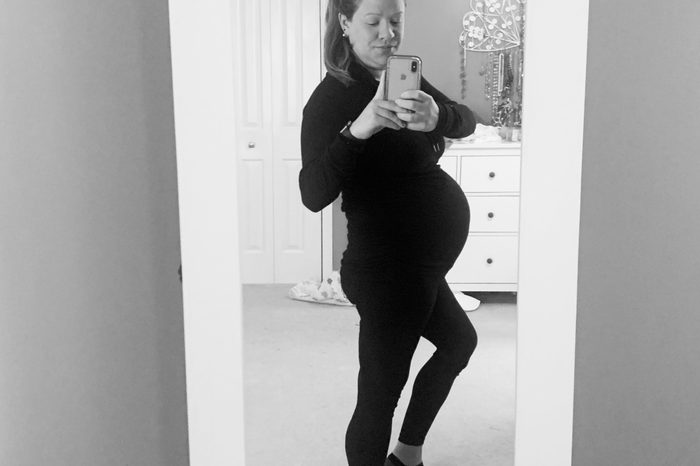
Planning for a home birth and happy about it
“Right now I’m trying to stay as calm as possible and maintain as much normalcy as I can for my two kids, but we haven’t left the house in several weeks and it’s really disappointing not to be able to spend time with friends or relax and enjoy the baby kicks without fears about what’s to come,” says Julia Pelly, 21 weeks pregnant with two children.
The worries are coming fast and furious. “With my previous births, I was most concerned with avoiding intervention and having healthy, happy babies. Now I’m worried about being ill at the time of my birth and separated from my newborn. I’m also worried about getting sick before she’s due and having to be hospitalized or going into early labour.”
The one worry Pelly doesn’t have is about her husband not being present for the birth, since they’re planning a home birth. However, there are other fears. “I am very worried that he or my kids might be sick and we would have to make the difficult choice for them not to be present. I am so worried about catching coronavirus that my children and I have not left the house in weeks and my husband has only left to go to the grocery store. I’ve heard that it can be associated with early labour and that really scares me.”
Opting for home birth is giving Pelly a sense of control and easing some of the panic. “We’ve been planning a home birth since I became pregnant, but now I’m extra glad that I won’t be going to the hospital! I am sticking by my plan to birth at home with my husband, my midwife, and my children. Homebirth is safe and knowing that I’ll avoid the hospital when they might have active cases of coronavirus is one of my primary comforts with this plan. I’m finding that I’m counting the days and really looking forward to getting my girl here but I’m also glad she’s safe and sound inside for now!”
(Psst: Here’s the truth about how soon you can exercise after giving birth.)
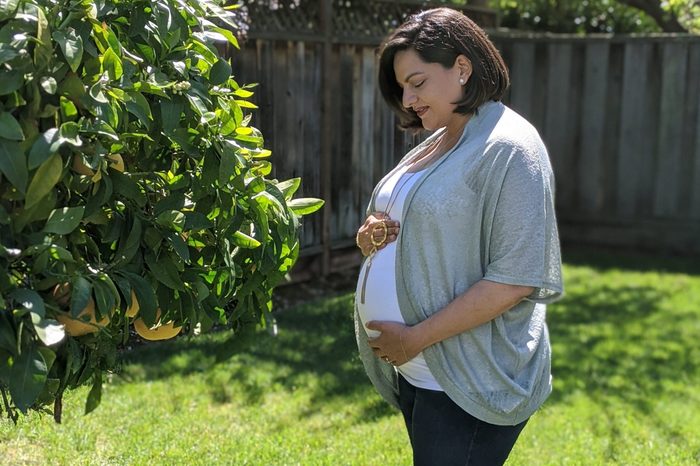
Having to change plans for childcare
“If I can be honest, I would love to keep my baby in my womb as long as possible! But I am 36 weeks pregnant and I am aware that my baby will be born in this uncertain situation,” says Iliana Molina, expecting her second baby. “That’s scary but also still a great blessing. So, I try to live one day at a time, focusing on positive feelings and thoughts. My husband and I are figuring out different scenarios for peace of mind. And I get all the emotional support that I can.”
Molina is busy prepping for her second baby, which will be her first child born in the U.S. “My husband, my son and I moved from Mexico to California five months ago. In the beginning, I was concerned about all the things that are different from one country to the other. Now that seems so far since my anxieties are more focused on situations I never imagined I would have to face: being isolated for so long, being by myself during delivery and my stay at the hospital, not having someone in advance to take care of my son while I am away, getting infected with Covid-19 and being separated from my baby.”
Originally, Molina planned for her mother to fly from Mexico to stay with her for a month and help out, but that scenario is no longer possible. “All the flights have been canceled, so that’s not an option anymore. My in-laws live in Arizona. They are amazing and offered to come and help but instead of a trip that would take one hour by plane, they will have to drive for 12 hours. We only have one close friend nearby, so he will be taking care of my son if I start labour before my due date. I am also worried about the shortages of baby supplies. I would never have imagined that it would be so hard to find diapers, wipes, and other things for the baby.”
Although Molina admits she “freaked out” when she first heard that partners might not be allowed in the delivery room, she feels calmer about it now, two weeks later. “There have been weekly updates from the hospital where I will deliver and so far, my husband is allowed to be with me but can’t leave and then come back. However, I am concerned about my son, because if things rush and I don’t make it to my due date, I think it would be better for us that my husband stays with me during the delivery and then leaves to be with my son. Still thinking about it.”
While she’s worried about being separated from her baby if either catches Covid-19, in the midst of panic and sickness, Molina chooses resilience and gratitude. “I have seen little miracles here and there that are really lifesavers right now. When I was worried because of the diapers shortage, a mom from a Facebook group offered me a box of diapers, a box of wipes and some other things for the baby. People around me have been so supportive, even strangers! They are willing to help, to listen and to take care of each other. The power of faith and prayer is real.”

Choosing to be positive
Twenty-eight weeks pregnant with her second child, Jenna Jonaitis is trying to envision what her delivery and postpartum will look like in this strange new world. “I imagine the hospital being more hectic than with my first delivery. I’m expecting not to be able to have visitors in the hospital to meet the baby. I’m thinking that my parents and my husband’s parents might not be able to see the baby in the hospital or even be able to care for our toddler while I’m in labour. There are just so many things up in the air.”
Due in late June, Jonaitis is wrapping her brain around the crisis as she changes plans. “I’m trying to emotionally and mentally set myself up for a different experience bringing a new life into the world. If things slow down by the end of June and become more ‘normal,’ I’ll be elated. But for me, it’s important to prepare for what could be coming. I had been envisioning both sets of grandparents coming to the hospital on the first day to meet the baby. We lived out of state with our first birth, and no family was able to visit us in the hospital. I was really hoping for a different experience this time around, but there are a lot worse things, and most importantly, I want everyone to stay safe including the new baby, our parents, and other relatives.”
After her first birth resulted in a C-section following three hours of pushing, Jonaitis is considering a vaginal-birth-after-cesarean (VBAC) this time. “I’m nervous because the hospital staff might look different. I might not be able to have as much support in the room, and the medical staff might not have as much time and resources to help with successfully having a VBAC. I know that another C-section has always been a possibility—maybe even a strong possibility. But I still wanted to give it my all. Now I’m second-guessing how great of a chance I have of being successful with it. It’s important for me because we want to have more than two children, and each C-section gets riskier.”
While she was previously nervous her husband wouldn’t be allowed in the room, those fears have lessened with recent news. “Now I’m hearing that hospitals have to allow partners in the room, so I’m hoping that remains the same. We never know what could happen, though.”
However, with a history of asthma and pneumonia, Jonaitis is particularly vulnerable. “I was hospitalized as a child for it, and so getting this respiratory illness—especially while I’m pregnant—is a bit terrifying. I’m also worried about my little one when they enter the world, what type of germs they’ll be exposed to, who will be able to visit, etc. All we can do though is take the best precautions, listen to recommendations, and make sacrifices where we need to for the safety of everyone. I know even if I can’t have support right near me, there will be lots of people supporting me from ‘afar’—even if they’re just a few miles down the road.”
Despite the fears, she’s choosing to be positive. “I believe going through this as a family could make us even stronger and closer. My husband was my ultimate champion the first time around and I am so lucky I have him in my corner again. We are very lucky. I’m also happy this is my second time around—I’d be even more terrified if this were my first pregnancy and delivery!”
As she faces the unknowns, Jonaitis is drawing strength from the legacy of women who have birthed before her. “I try to think of other women who have given birth during world wars, or who have given birth while their husband is overseas, for example. Women are powerful creatures, and I do believe we can do anything. It’s always nice to have that support, though. I’m trying to draw inspiration from other strong women throughout history and who I know in my life.”
(If you’re planning on doing yoga during pregnancy, these are the safest prenatal yoga poses for each trimester.)
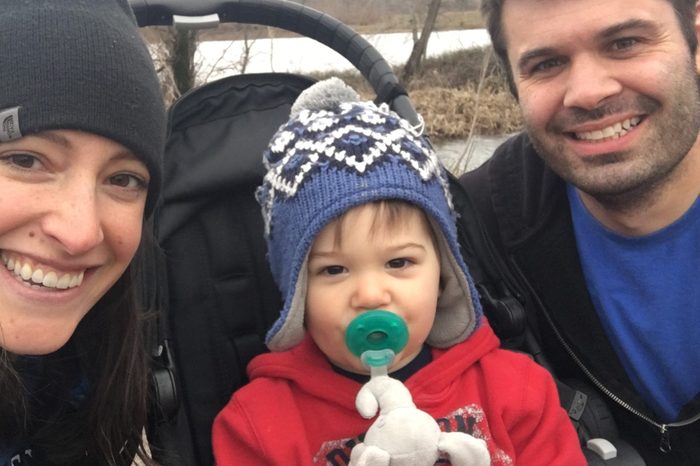
Empathy for pregnant women everywhere
“I am feeling lots of grief for mothers delivering right now,” reveals Kaitlin Doyle, 31 weeks pregnant with her second child. “It is such a joyful life event, one that is so wonderful to share with family and friends. I am sad for moms who cannot introduce their babies to family members. I am sad for friends and family that are canceling baby showers and other celebrations for their children. I am so sad for moms going through loss. I am sad for moms who cannot go to support groups and breastfeeding classes that were so helpful to me with my first baby.”
Among those in her thoughts are mothers short on resources and those struggling with postpartum depression. “I had a hard time with my first and was surrounded by family and friends. This is not an option for moms right now and it breaks my heart. I worry about what things will be like when my due date is a bit closer. Last time I did not share that I was having a hard time because I knew I had a healthy baby, and a great support system; the good fortune of that was not lost on me. What did I have to be sad about? This time my husband and I know what to look for if I am struggling, but it is hard to know if having friends and family support outside of online will even be an option.”
While Doyle admits that she tends to be a worrier, she’s hopeful her husband will be allowed into the hospital room with her. “I really can’t imagine bringing our child into the world without him. This is a worry I try not to dwell on. I have been intentionally focusing on all of the many, amazing, good things that are happening in response to this pandemic, but I do worry about my baby contracting Covid-19 too. Right now, they are saying it doesn’t seem to be too much of a threat to moms and new babies, but it is so new and when it comes to infants, any illness is pretty terrifying!”
Although none of this is what she expected, Doyle centers herself by finding little joys. “In all of this, I am so grateful for health. Just a few months ago, laying on the couch with a puke bucket while my son watched too much Sesame Street, this is certainly not how I imagined my third trimester, but I am thankful for extra time with my husband and first baby. Hopefully, we are filling my son’s bucket with all our undivided attention before his sister joins our family. It is sure going to make the ability to hug friends and family, swing through the grocery store for one quick item, head to the library, greet a stranger in the hallway at work, and enjoy a Saturday at the park something I will never again take for granted.”
Next, check out the best activities for self-isolation that can boost your wellbeing.
